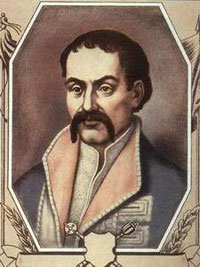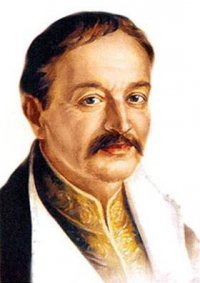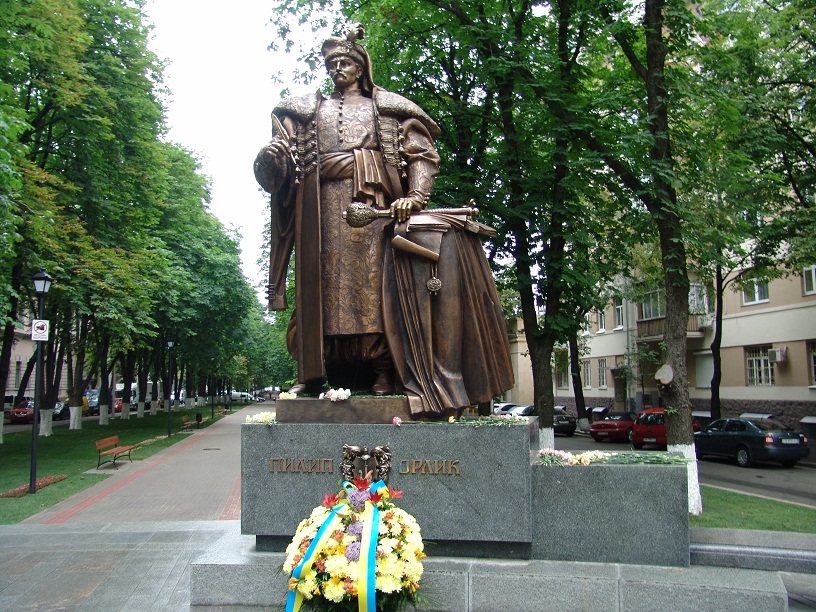<Back to Index>
- Physician and Astronomer Heinrich Wilhelm Matthäus Olbers, 1758
- Composer Simon Sechter, 1788
- Hetman of Ukraine Pylyp Stepanovych Orlyk, 1672
PAGE SPONSOR


Pylyp Stepanovych Orlyk (Ukrainian: Пилип Степанович Орлик, Polish: Filip Orlik) (born on October 11, 1672 in Kosuta, Ashmyany county, Grand Duchy of Lithuania (today in Vileyka Raion, Belarus), died on May 26, 1742 in Jassy, Principality of Moldavia (today Iaşi, Romania) was a Zaporozhian Cossack starshyna, Hetman in exile, diplomat, secretary and close associate of Hetman Ivan Mazepa.
Pylyp Orlyk was born in the village of Kosuta, Ashmyany county, Grand Duchy of Lithuania (Vileyka district of modern day Belarus), in a family of Czech origin.
Orlyk first studied at the Jesuit college in Vilnius and until
1694 at Kyiv Mohyla Academy.
In 1698 he was appointed secretary of the consistory
of Kiev metropolia.
In 1699 he became a senior member of Hetman Ivan Mazepa's General Military
Chancellery and 1706 was appointed general chancellor
and at that position he was Mazepa's closest
aide, facilitated Mazepa's secret
correspondence with the Poles and Swedes, and assisted Mazepa in his
efforts to form an anti - Russian coalition.
After the Battle of Poltava in 1709, he escaped together with Hetman Ivan Mazepa and king Charles XII of Sweden to Bender in the Principality of Moldavia, where Mazepa soon died. Pylyp Orlyk was then chosen as a Hetman in exile by the cossacks and the Swedish king Charles XII. While in Bender Orlyk wrote one of the first state constitutions in Europe. This Constitution of Pylyp Orlyk was confirmed by Charles XII and it also names him as the protector of Ukraine.
Between 1711 and 1714, together with Crimean Tatars and small groups of Cossacks, Orlyk carried out unsuccessful raids into Right - bank Ukraine. Afterwards, Pylyp Orlyk now together with several other cossacks followed the Swedish king Charles XII to Sweden via Vienna and Stralsund. Orlyk with his family and about 40 other Cossacks arrived in Ystad, Sweden, in late November 1715. After some months in Ystad they lived in the city of Kristianstad for some years. Orlyk and his family left Stockholm in 1720 but as late as 1747 his widow and children received financial support from the Parliament of Sweden. From Sweden Orlyk first went to Hamburg, Hannover, Prague, Wrocław and Kraków, where he left his family to stay in a monastery. Orlyk went on to France and in 1722 he arrived in Iaşi in Ottoman Turkey in order to organize an alliance against the Russian Empire. From there he went on to Thessaloniki and from the mid 1730s he is known to have lived in Budjak. He died 1742 in Jassy, Principality of Moldavia (today Iaşi, Romania).
Orlyk wrote numerous proclamations and essays about Ukraine including the 1710 Constitution of Pylyp Orlyk.
In his history of Salonica Mark Mazower says
After years fighting against the Muscovite tsars, Orlyk fled first to Sweden, and then passed through central Europe to the relative safety of the Ottoman lands. On 2 November 1722… the fifty - year - old Orlyk was ordered by the Porte to Salonica. There this cultivated and warm - hearted man spent no less than twelve years in exile, watching the twists and turns of European politics from the sidelines while his impoverished wife remained in Cracow and his eight children were dispersed throughout Europe. Only in March 1734 was he released, thanks to French intervention, and allowed to move north; still trying to organize an uprising in the Ukraine, he died in poverty nine years later. Orlyk's misfortune has proved to be the historian's gain, for from the day of his arrival he kept a diary which offers a unique insight into the eighteenth - century city… His urgent scrawl gives access not only to his voluminous political correspondence, most of which — in Latin, French, Polish and Ukrainian — was duly copied into his journals, but also to the rigours of daily life in his place of exile. The misbehaviour of his loutish servants, the local fare, his bag after a day's shooting in the plains, stories told him by tailors, interpreters and bodyguards enliven its pages. Jesuits, consuls, doctors, spies and the Turkish judges and governors who ran the city all encountered the busy exile. Most of the time, he lived well, considering his predicament...
Pylyp Orlyk married Hanna Hertsyk in the mid 1690s. She was of Jewish descent, a daughter of the colonel Pavlo Semenovych Hertsyk (a close ally of Mazepa) of the Poltava regiment. Pylyp and Hanna had eight children.
